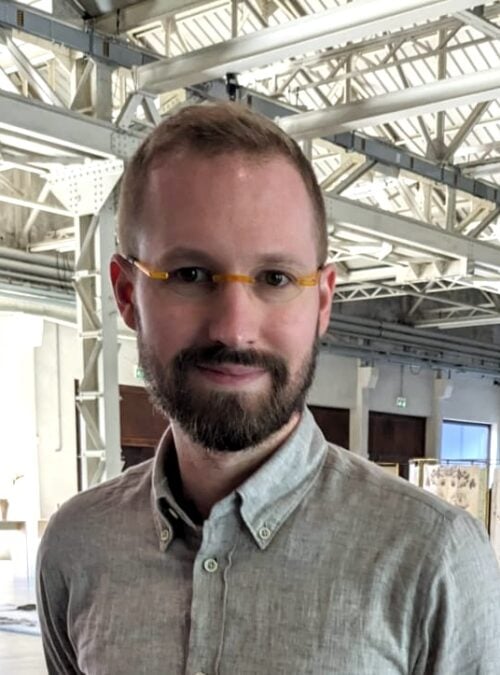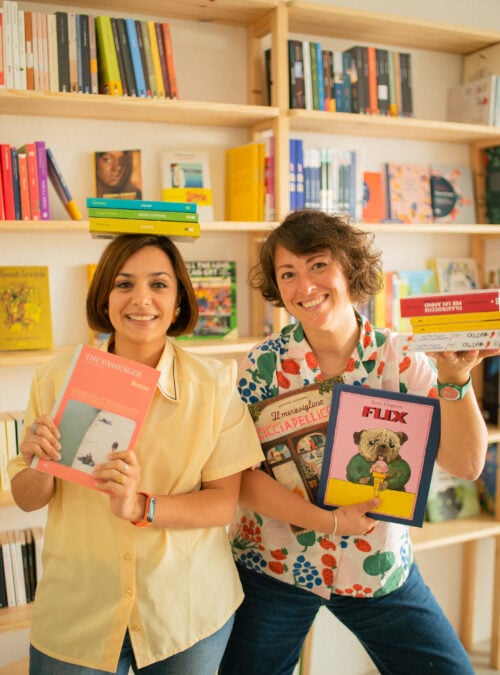Interview with Fabio Gambaro on the tenth anniversary of Italissimo
Author: Federica Malinverno, newitalianbooks

How has Italissimo changed over the course of these ten editions?
The festival has grown a lot since 2016. The numbers speak for themselves: from about ten events in two locations to about forty events in about fifteen different locations, from three or four guests to about forty guests. The festival has expanded and has a dimension that it didn’t have ten years ago. While at the beginning it was a gamble, today I would say that the gamble has paid off.
Compared to the very first editions, the formula has changed. At the beginning we adopted the festival formula with a guest of honour, first Baricco and then Saviano, based on the model of Dedica in Pordenone, which is a festival that invites a single author and organises a series of events around him.
Today the formula has evolved according to a more traditional model. We invite authors from Italy and get them to talk with French writers in line with the main idea of the festival, that is, to present Italian literature in a sort of dialogue with French literature.
Some elements, however, remain unchanged: the opening at Sciences Po, featuring a dialogue between a leading voice in Italian literature—this year, Silvia Avallone—and a French counterpart; and the central role of the Maison de la Poésie, which hosts a dozen events. For us, the festival is not only a space for debate but also a stage for the theatricality of literature.Finally, another constant of the festival is to invite authors who are well-known to critics and the public in France (such as Marco Lodoli or Emanuele Trevi) as well as new voices (this year, for example, Greta Olivo, Alessandra Carati, Monica Acito, Francesca Giannone).
Have there been any pivotal moments in the history of the festival? Any significant moments that have led to particular challenges?
I would highlight the two-year period that Italy was Guest of Honour at the Paris Book Fair (2022-2023), which was a time of great editorial interest in Italian literature, and the year of the pandemic, an anomalous year for everyone, which taught us many things, such as how to use digital technologies to organise remote events.
How do you see the future of the festival?
The festival will not continue to grow; on the contrary, I would like to make it a little smaller in the coming years. If the festival grows, so must the funding, which for us is robust, given that almost all our guests come from Italy and that, as a matter of professionalism, we don’t have volunteers, but we pay every interpreter, facilitator and collaborator.
What does it mean to work on the programme for a festival like Italissimo?
First of all, it means having to say no every year, because we can only invite a limited number of authors. The main task of the festival director is to organise things according to his or her logistical and financial means.
Moreover, putting together a programme is a long and complex operation, partly because there are many people to talk to: not only the Italian and French publishers and the authors, but also agents, who are increasingly present in the Italian publishing world.
As for the criteria we use, in addition to presenting well-known and lesser-known authors and working with different publishing houses, we try to present authors who we consider to be of high quality, that is, authors who we consider interesting, stimulating and original, each in their own field and genre. Always taking into account what is published in France.
Moreover, even though it’s a contemporary literature festival, we sometimes make exceptions, always in the name of quality: for example, last year we presented the translation of a text that was first published in 1975, Horcynus Orca (by Stefano D’Arrigo, translated by Monique Baccelli and Antonio Werli for Le Nouvel Attila, 2023). Finally, we also had first-time authors, such as Giuliano Da Empoli, who we already invited and who is returning this year.
If, as I said at the beginning, the festival has grown, does that mean that interest in Italian literature in France has grown?
Yes, global interest has grown. We have accompanied this and perhaps even stimulated it a little. In fact, over time publishers have realised the importance of the Italissimo stage and now they ask us to invite their authors. As I said, it’s essential for us to collaborate with all publishers, from the historical ones such as Gallimard, Liana Levi, Albin Michel, to the smaller ones that have recently opened up to Italian literature. And this is in line with Italissimo’s basic characteristic: to present authors whose books are translated into French.
If we look at all the authors invited to the festival over the years, can we get a picture of Italian literature translated in France?
Yes, I’d say we’re a good representation of this sector, considering that in the history of Italissimo we’ve invited about 300 authors, some even several times, always in relation to the translations of their books in France. Consequently, some trends in Italian literature translated in France are reflected in the history of the authors we have invited over time. And among these trends, I would first emphasise the growing number of translated female authors, which reflects the greater attention paid to these same authors in Italy. Furthermore, since the success of Elena Ferrante, interest in stories of female emancipation, often set against the backdrop of Italian history, has not yet died out. Interest in thrillers in the broadest sense has also grown, and historical novels are very popular, especially those set between the 19th and 20th centuries.
Does the success of the festival reflect the success of literary festivals in general in recent years?
I think so. Literature is no longer just a solitary and individual activity, but has become a collective ritual, and readers need to see authors and meet each other. Festivals allow us to create a community of readers and bring them into contact with authors. Furthermore, our festival is called the Festival de littérature et culture italiennes: the focus is on literature but we also have a cinema section, we put on shows and readings. I’d like to do more on music, but there are some financial and logistical difficulties.
In recent years Italissimo has also been held in Lyon: is taking the festival outside Paris one of your goals for the future?
For the last four years we’ve had a spin-off of the Festival in Lyon, thanks to our collaboration with the Institute of Culture. It’s a smaller event (lasting about a weekend and taking place in the autumn), but it’s gaining popularity. In fact, at the beginning we thought of taking Italissimo around France and having an edition in a different city every year. However, in addition to the logistical and financial difficulties, we realised that it takes time for an event to grow and for the public to become attached to it, and that it was therefore difficult to hold the festival in a different place every year. But we don’t rule out the possibility of collaborating with other cities in the future, should the opportunity arise.










